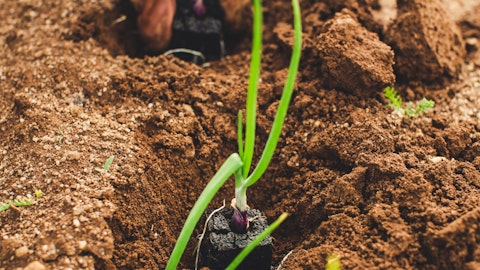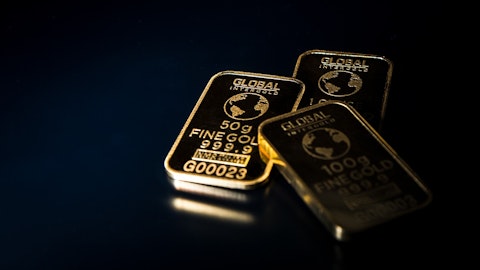Andrew McCarthy: Good day everyone. Many thanks for the call and the presentation and the Q&A session. I wanted to switch over to iodine a little bit. You had a very strong quarter in terms of price realization, about $63 a kilo. Just wondering, going towards the end of the year and into 2023, how you’re seeing the supply/demand dynamics there. And are we yet reaching peak prices in that segment or not? That would be my first question. Thanks.
Ricardo Ramos: Okay. Well, as you said, we are very proud about the results of this quarter for the iodine business. I would say that is the matter of because the demand has been there, especially explained because of the media and other applications. But also it’s just to say that we have been able to increase our sales because also we have been able to produce more iodine than in the last year, because some improvements in our operations. And as you know, we have been investing to expand our capacity of iodine. So my point is that we have been able to deliver the iodine that our customers needs. Regarding to the next year, well, always is difficult to say. Everything will depend, as you said, regarding demand and supply. Regarding the demand, we see some uncertainty because of the situation in Europe that could affect some applications, but still we have some way to run to see finally what happened.
So that’s one point. And regarding to the supply, well, today, we have not seen more supply coming. Next year, we know that some new capacity could arrive, but still we need to see finally that happen. Anyhow, we are also investing in order to have more capacity. If the market needs more iodine, we believe that we will be able to deliver that iodine to the market.
Andrew McCarthy: Great. Thanks very much. And just going back to lithium, we have been seeing recently some up and down customs data in terms of — especially around volumes and prices in China. Just wondering if you could share your thoughts on that, whether that — some of that’s maybe onetime effects or mix effects in certain months or anything there that you’re saying that you’d be a bit more concerned about? Thanks very much.
Gerardo Illanes: Hi, Andrew, this is Gerardo. Yeah, there is a lot of information that comes from customers that shows our exports to the different markets. But that’s not only the information, since there are price adjustments and things like that, that are not necessarily being reflected on those numbers. So taking strong conclusions out of these figures may be a mistake. And also, there is another thing to keep in consideration that we export product from Chile to, in most of the cases, to our own subsidiaries, where later on, the product is being sold to the market, so we keep inventories in our subsidiaries. So the fact that one particular quarter, the volumes were significantly higher or lower than the previous quarter doesn’t necessarily mean that we’re going to sell significantly more or less during the next quarter.
We are projecting that for this year, the total volumes of lithium sold will be more than 150,000 tons. And that, of course, includes product that is going to be sold from Chile and also product that is being sold from our commercial offices.
Andrew McCarthy: Okay. Thanks, Gerardo
Operator: Our next question will come from Chris Kapsch with Loop Capital Markets. You may now go ahead.
Chris Kapsch: Yes, hi, thank you. Sort of a follow-up on a prior question but I wanted to flesh it out a bit. So I’m attending a big battery materials industry conference currently, and there’s a lot of discussion at the conference about the Inflation Reduction Act, or IRA, which obviously provides support or stimulus for EV adoption in the US. So as I understand, the production of battery materials or processing of materials in Chile would qualify under the structure of the IRA because of the status of Chile as a free trade partner. So was just wondering, could you just confirm your — the status there in terms of your footprint? And two, because of this free trade partner status and presumed qualification within this IRA, just curious, has there been a step-up in SQM’s commercial engagement with potential downstream partners in the US as a result of this bill’s passage and its future growth implications in the US?
Carlos Diaz: Yes. Well, this is Carlos Diaz. We understand, yes, we — our product will qualify for that as Chile have a free trade agreement with the United States. But this is something that I have to be shaky about our customer.
Chris Kapsch: Yes. I’m just curious if it is — there’s so much enthusiasm around the implications. I’m just wondering if you’re seeing that in your commercial engagement. And is this some — is this legislation, did it help influence the underwriting of your hydroxide expansion intentions that you just announced, or is it just completely independent investment decision? Thank you.
Carlos Diaz: Yes. We have now a signed contract with the customer, the data . Those are customers that have developed a project in the United States, and obviously, they will need our product that is coming from Chile. What I said before because they understand that we have — we would qualify as a product coming from the country with the free trade agreement with the United States.
Chris Kapsch: Thank you.
Operator: Our next question will come from Santhosh Seshadri with HSBC. You may now go ahead.




